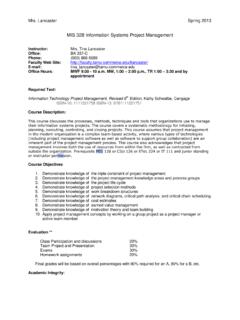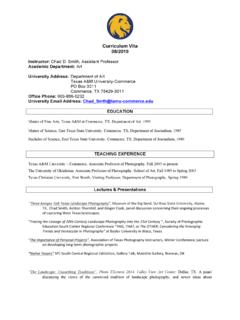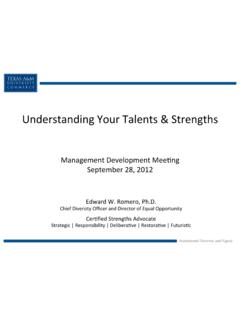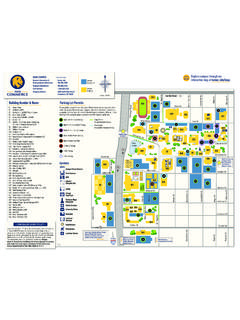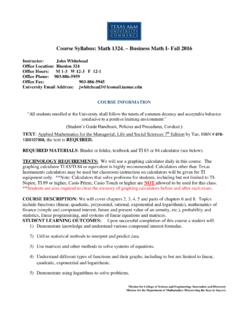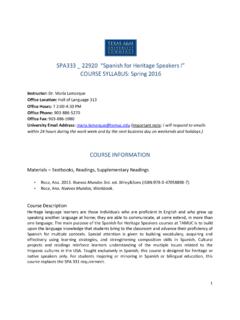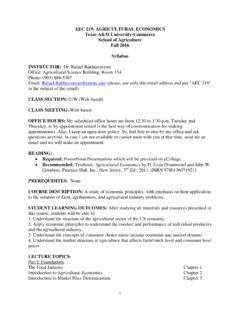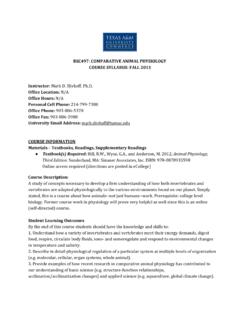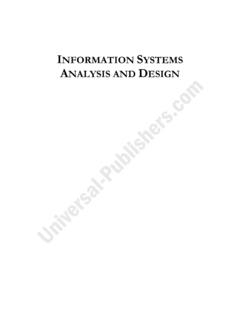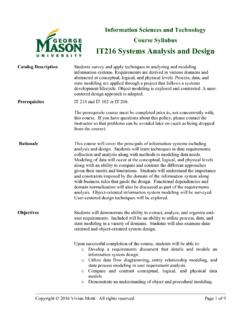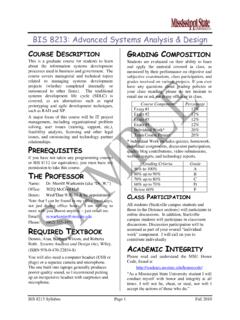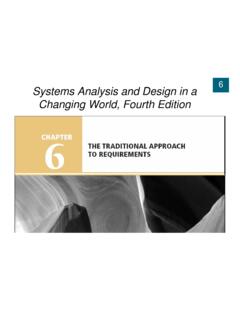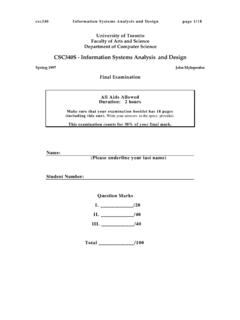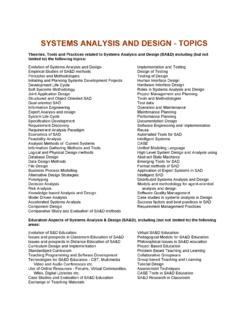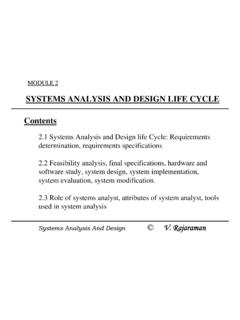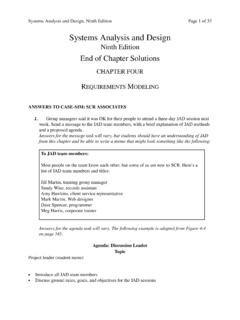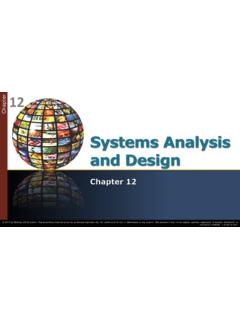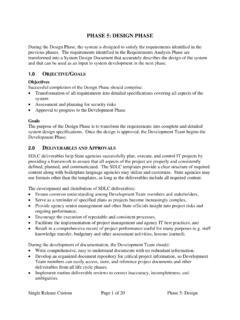Transcription of SYLLABUS SPRING 2015 CSCI 359.001 SYSTEMS …
1 1 SYLLABUS SPRING 2015 CSCI SYSTEMS analysis AND design ROOM: JOUR 234 Day and Time: Tuesday & Thursday: 9:30-10:45; Meets From 1/20/ 2015 thru 05/15/ 2015 Instructor: Dr. Thomas E. Kollman Home Office Phone: (972) 429-0912 Cell: (214) 476-3184 Office Hours: By Appointment E-Mail: Additional for appointment or e-mail, please when you contact include CSCI 359 in the subject of your message. COURSE DESCRIPTION: TEXT: SYSTEMS analysis AND design (10TH Edition), 2014, Harry J. Rosenblatt, part of the Shelly Cashman Series. The content of the system analysis and design life cycle (SDLC) in this textbook closely mirrors what our student audience will face in the local area job market.
2 One of the best ways to learn SDLC is through case studies and this textbook has an excellent running case study through each chapter plus other case studies used for demonstrating each main topic in a chapter section, all more current examples than are found in other competing textbooks. COURSE CONTENT: Chapters: 1-12, plus a four part SYSTEMS analyst toolkit covering: Communication tools, CASE tools, Financial analysis tools and Internet Resource tools. MAIN OBJECTIVE: This course is intended to provide a comprehensive, balanced and up-to-date coverage of traditional structured analysis , object-oriented concepts, and agile methods approach to the introduction of SYSTEMS analysis and design .
3 2 LEARNING OBJECTIVES: 1) Understand concepts relating to different types of information SYSTEMS 2) Explain the purpose and activities of the SYSTEMS development life cycle phases 3) Understand project management techniques 4) Identify and understand system inputs and outputs 5) Understand and model system entities and data stores 6) Understand and model system processes, events, and data flows within a system 7) Understand and model classes of data within a system 8) Understand concepts relating to various models, tools, and techniques used in system analysis and design COURSE EVALUATION: BASIS FOR EVAUATION: Quizzes 25% Final Exam 25% Assignments 25% Case Assignments and Presentations 25% GRADING POLICY: A: 100% - 90% B: 89% - 80% C: 79% - 70% D: 69% - 60% F: Less than 60% The professor reserves the rights to reward students for continuous hard work or for an exceptional novel scientific work (as judged by the professor) relevant to the topics covered.
4 The professor reserves the right to assign advanced problems 3 for extra credit to interested students. The programs will be submitted in an electronic form, whereas the other assignments are to be written in a paper unless otherwise specified. Team Presentations Section: 359-001 Dates 4/28&30/ 2015 during class. Assignments Section: 359-001 Dates when due during class. Final Exam Section: 359-001 5/14/ 2015 Time 8-10 AM COURSE POLICIES: EVALUATION CRITERIA EXPLAINED: . Students are expected to be active participants in each class meeting.. Assignments will consist of a number of individual and group in class and homework tasks. Students will be given specific guidance on the amount of collaboration permitted for each assignment.
5 Unless otherwise specified, all assignments are individual assignments, and thus must be completely the original work of the student submitting them and include proper citations to the published work of others.. At the conclusion of the group projects, students will be required to complete group member evaluations and analysis of performance rating surveys. SHORT QUIZZES: Quizzes are to be answered independently during the class period. The quizzes will be administered in class. Make up quizzes will not be given. However the lowest two quiz grades will be dropped. FINAL EXAM: The comprehensive final exam will consist of objective questions and will require a technological comprehension that covers the lecture material and assigned readings.
6 The content will come from the text and other material presented in lecture sessions as well as outside reading and project assignments. Note that material presented in class and group assignments will supplement the assigned readings. Therefore, class attendance and good note taking are essential for 4 success. Students will be informed of the test date in advance. The test will take one class period and will be given at the scheduled time only. No opportunity will be given to take the test at an earlier or later times except in extreme cases as judged by the professor. MAKEUP: Except extreme cases (as judged by the professor), no individual makeup tests will be permitted.
7 STUDENTS WITH DISABILITIES ACT COMPLANCE: Students requesting accommodations please contact: Office of Student Disability Resources and Services, Gee Library, Room 132. (903) 886-5150 or (903) 886-5835 phone, (903) 468-8148 Fax, or E-mail: ATTENDANCE POLICY: Students are expected to be present at all class lectures. If a student is absent from class on the due date of any assignment, they are expected to make alternative arrangements to assure that the assignment is turned in ON TIME. Any student wishing to withdraw from the course must do this officially as outlined in the class schedule. THE PROFESSOR CANNOT DROP OR WITHDRAW ANY STUDENT. COURSE REQUIREMENT DEADLINES: Credit will be given for ONLY those quiz exam(s), assignment(s) and/or project(s) turned in no later than the deadline(s) announced by the professor unless prior arrangements have been made with the professor.
8 ACADEMIC ETHICS AND HONESTY STATEMENT: Scholarly dishonesty is a violation of the Code of Student Conduct. Scholarly dishonesty includes, but is not limited to, cheating on a test, plagiarism, and collusion. All students enrolled at the University shall follow the tenets of common decency and acceptable behavior conducive to a positive learning environment. (See Student s Guide Handbook, Policies and Procedures Conduct) 5 CHEATING: includes copying from another student s test or homework assignments or projects or quizzes, using materials not authorized, collaborating with or seeking aid from another student during a test, knowingly using, buying, selling, stealing, or soliciting the contents of a non-administered test, and substituting for another person to take a test.
9 PLAGIARISM: is the appropriating, buying, receiving as a gift, or obtaining by any means another s work and the unacknowledged submission or incorporation of it in one s own written work. PLAGIARISM: in any written paper or test or assignment or quiz or project including code and document, you are guilty of the academic offense known as plagiarism if you half-copy or copy the author s sentences, words of any part of the content. This will result in an automatic grade of F for the course. Hence any of these must be fully avoided in order not to fail from the class. Students copying from work done in previous semesters by former students as well as copying from internet sources without proper reference will result in the failure of the course.
10 You cannot mix the author s words with your own or plug your synonyms into the author s sentence structure. To prevent unintentional borrowing, resist the temptation to look at the source as you write. The author s words, phrases, sentences must be put into your words, in your way of writing! When you do this, you are demonstrating the ability of understanding and comprehension! COLLUSION: is the unauthorized collaboration with another person in preparing written work for fulfillment of course requirements. Academic dishonesty is a serious offense in college. You will be given not only a failing grade on the assignment or test, but also a failing grade for the class.

